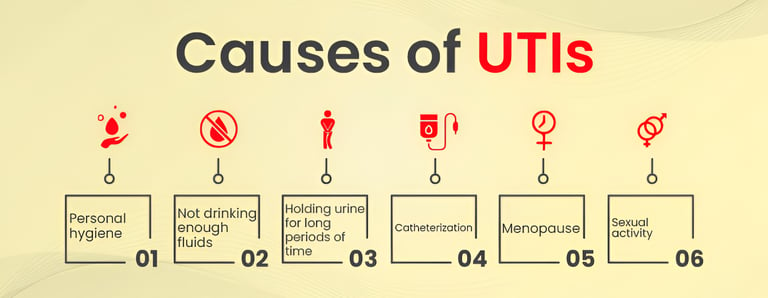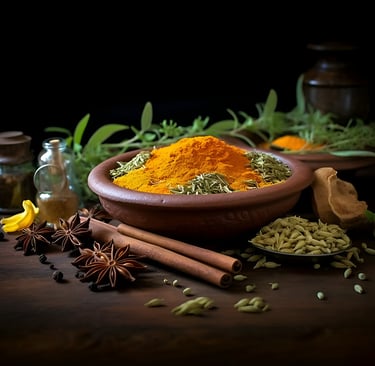Top 6 Ayurvedic Treatments for Urinary Tract Infection
Looking for relief from Urinary Tract Infection discomfort? Dive into our array of 6 Ayurvedic remedies, meticulously chosen for holistic wellness. Start your journey today!
UTIs are more common than you think!
UTI (Urinary Tract Infection)
A urinary tract infection, or UTI, is an infection in any part of your urinary system, which includes your kidneys, bladder, ureters, and urethra.
In Ayurveda, UTIs are often associated with an imbalance in the “Pitta” dosha, which governs heat and metabolism in the body. Excess heat or inflammation in the urinary tract can contribute to UTIs.
Types of UTI :-
· Cystitis (bladder) :- You might feel like you need to pee a lot, or it might hurt when you pee. You might also have lower belly pain and cloudy or bloody urine.
· Pyelonephritis (kidneys) :- This can cause fever, chills, nausea, vomiting, and pain in your upper back or side.
· Urethritis (urethra) :- This can cause a discharge and burning when you pee.
The symptoms of a UTI
· Recurrent infections, especially in females.
· Kidney damage may occur due to untreated UTIs.
· Urethral narrowing in men.
· A burning feeling when you pee.
· A frequent or intense urge to pee, even though little comes out when you do.
· Cloudy, dark, bloody, or strange-smelling pee.
· Feeling tired or shaky.
· Fever or chills (a sign that the infection may have reached your kidneys).
· Pain or pressure in your back or lower abdomen.
Causes of UTI :-
As per Ayurveda, UTIs are clubbed under a broad term called 'Mutrakrichha’ which includes kidney disorders and urinary tract infections. The imbalance within ‘Pitta Dosha’ results in these infections.
· Less intake of water
· Consumption of too hot, sour, or spicy foods.
· Tobacco and Alcohol usage.
· Suppressing the natural call. (Vega Dharana)
· Habit of retaining urine in the bladder for a longer duration.
· Overexposure to sunlight.
· Stress
Treatment and Management for UTI :-
Ayurvedic Herbs : -
Ayurvedic formulations and herbs make the treatment an effective one as it preserves normal pH which reduces the bacterial load. Herbs that are known for the management of such infections are:
Gokshura,
Punarnava,
Varuna,
Guduchi,
Bangshil, etc...
Also,
· Intake of spicy foods should be reduced as they can irritate the bladder lining making it difficult to urinate.
· Drink as much water as possible.
· Fresh lemon juice, coconut water, cranberry juice, orange juice, sugarcane juice, and pineapple juice are very beneficial.
· Probiotics such as curd and yogurt may help correct any imbalances caused by bacterial infections.
· Coriander drink will nourish and cool the urinary tract and accordingly flush out the toxins.
· One must be careful with personal hygiene, vaginal cleaning should be done properly, as proper cleaning reduces the chances of bacterial growth.
· Cotton and loose-fitting clothes and innerwear should be preferred.
· Use dry clothes after bath.
· During menstrual periods, women should practice good personal hygiene practices.
· Wipe from front to back after defecation.
· Urinate before and after sexual activity and properly maintain hygiene in your genital area.
· Do not hold the urge to urinate as it retains toxins in your system.
Note- We always recommend to consume any herb or supplement under doctors guidance regarding dosage and herb. If you'd like a personalized treatment plan from our doctors you can book a consultation with us.
Are UTI and ED interconnected ?
Urinary tract infections (UTIs) and erectile dysfunction (ED) may seem unrelated at first, but they can be interconnected through various mechanisms, especially in certain medical contexts.
1. Underlying Health Conditions: UTIs and ED can both be symptoms or consequences of underlying health conditions such as diabetes , cardiovascular disease or neurological disorders. Ayurveda recognizes these conditions as imbalances in the doshas (bioenergies) and offers personalized approaches to restore balance and health.
2. Medication Effects: Certain medications used to treat UTIs, such as antibiotics, can have side effects that impact erectile function. Additionally, Ayurvedic remedies for UTIs and ED focus on herbal supplements, dietary changes, and lifestyle modifications to promote overall well-being and address root causes.
3. Psychological Factors: Both UTIs and ED can be influenced by psychological factors such as stress, anxiety, and depression. Ayurveda emphasizes the mind-body connection and offers therapies like meditation, yoga, and specific herbal formulations to manage stress and promote mental clarity, which can indirectly improve urinary and erectile function.
4. Age and Hormonal Changes: As individuals age, they become more prone to both UTIs and ED. Ayurvedic practices aim to balance the doshas throughout life stages, offering dietary recommendations, rejuvenating therapies, and herbal remedies to support hormonal health and vitality.
5. Vascular Health: Vascular health is essential for both urinary and erectile function. Ayurvedic treatments focus on improving circulation through specific herbs, dietary guidelines, and practices like abhyanga (self-massage) and pranayama (breathwork) to support cardiovascular health and enhance sexual function.
6. Sexual Activity: In some cases, sexual activity can exacerbate UTIs. Ayurveda offers guidance on sexual hygiene, including cleansing practices and herbal preparations to prevent infections while maintaining sexual vitality. Additionally, holistic approaches address ED by promoting intimacy, communication, and emotional connection between partners.
7. Inflammation and Infection: Chronic inflammation or infection in the urinary tract can affect erectile function through various pathways, including nerve damage, vascular changes, and psychological stress. Ayurvedic remedies for UTIs focus on reducing inflammation, strengthening the immune system, and restoring balance to the body's natural defenses.
To conclude
UTIs can be frustrating, but with the right care and preventive steps, you can take back control of your health. Remember, your well-being is worth the effort! 🌟




